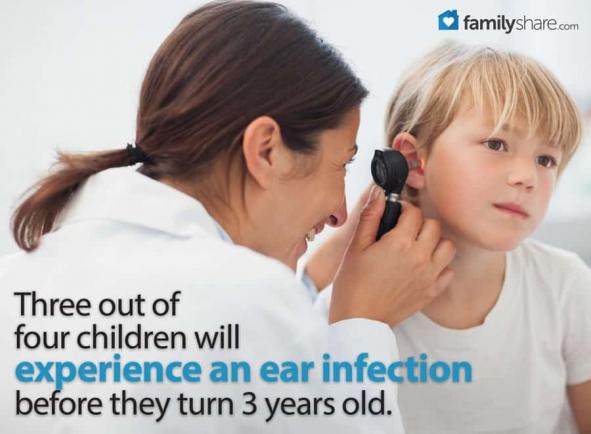
Acute otitis media is a middle ear infection and can be caused by either a virus or bacteria. It invades the air-filled space behind the eardrum. This causes swelling, fluid buildup, and pressure in the middle ear which results in pain. Often an ear infection occurs when the Eustachian tubes (tubes inside the ear that are responsible for normal drainage) become blocked. Blockage can be the result of a cold, the flu, allergies, nasal congestion or nasal swelling.
Anyone can have ear infections, but they are most common in children. Three out of four children will experience an ear infection before they turn 3 years old. This is probably because their eustachian tubes are narrower and more horizontal than adults. This makes them more likely to become blocked. Also, children are not as immune to infections as adults. Therefore, they may become ill with something that leads to an ear infection. Some of the most common risk factors are:
Age
Common in children 6 months to 2 years old
Family history
More common among children with a family history of ear infections
Infants that are bottle fed
Children in daycare
children who are cared for outside of the home are often exposed to more infections
Children exposed to tobacco smoke or large amounts of air pollution
Ear infections are most prevalent during the fall and winter months. Even though the weather does not put you at risk, the colds and flu that are common during those seasons will.
Recognizing an ear infection can be difficult because the symptoms can be similar to other infections or can be very mild. Often the body is able to fight the infection itself. Symptoms of an ear infection may include:
-
Loss of appetite
-
Vomiting
-
Diarrhea
-
Fever of 100° F or higher
-
Headache
-
Difficulty sleeping
-
Irritability
-
Loss of balance
-
Fluid drainage from the ear
-
Pulling at or "playing"� with the ears
-
Sore throat
If your child is still suffering from symptoms after two or three days, then it may be time to have him or her see a doctor.
Treatments can include antibiotics or prescription-strength numbing drops. Another treatment is placing a warm compress on the ear, and trying to alleviate symptoms caused by a cold or the flu. Other alternative treatments are not recommended. In cases of repeated ear infections the doctor may recommend surgically placing tubes in the ears.
Prevention of ear infections can be very important because infections can cause hearing impairment or speech and developmental delays. The best way to prevent ear infections is to prevent colds and flu. Make sure your children receive the flu vaccination as they are at risk for contracting an infection that could lead to an ear infection.

